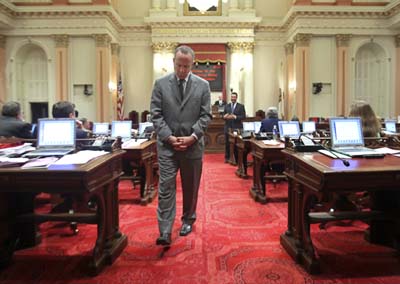
California legislative leaders on Tuesday made what they hoped
would be a last push for one more Republican to support their $42
billion budget fix, warning of fiscal disaster if none of the
holdouts puts aside opposition to tax increases.
By DON THOMPSON
SACRAMENTO
California legislative leaders on Tuesday made what they hoped would be a last push for one more Republican to support their $42 billion budget fix, warning of fiscal disaster if none of the holdouts puts aside opposition to tax increases.
The leader of the state Senate said the chamber would remain in continous session until the legislation is passed. Meanwhile, state officials were sending out layoff notices and were expected to freeze hundreds of public works projects employing nearly 92,000 construction workers.
Tax revenues have plunged by billions of dollars as the recession clobbers California, leaving the state without sufficient cash to pay its bills. The remedy offered by the governor and lawmakers is to reopen the budget in the middle of the fiscal year, enact deep cuts and tax increases, and work out a fix that will cover the state’s spending through June 2010.
The tax increases contained in the current legislative package, worth some $14.4 billion, could be an insurmountable hurdle. The state Assembly appears to have the votes to pass the budget plan, but it is snagged in the Senate, where three GOP votes are needed but only two Republican senators have signed on.
“I think it’s time that we need to stop treating the taxpayers of this state of California as a personal ATM,” Sen. Tony Strickland, R-Thousand Oaks, said during a Senate floor debate on the tax increases. “Funds are overdrawn.”
The Senate’s leader said the chamber would not adjourn until it passes the budget plan, which is intended to close a $42 billion deficit in this fiscal year and the next one.
“It is clear there is going to be catastrophic consequences for Californians if we don’t get it done today,” Senate President Pro Tem Darrell Steinberg told reporters Tuesday.
Asked by reporters if he had a backup plan if the lockdown fails to produce a compromise, Steinberg, D-Sacramento, said, “We’re going to get it done. That’s the plan.”
Tuesday’s legislative session followed a frustrating holiday weekend that failed to yield a compromise, despite one all-night session and others that churned into the evening.
Despite attempts at backroom deal-cutting, legislative leaders were unable to find one additional Republican in the Senate. Because California budgets require approval of two-thirds of the Assembly and Senate, Democrats who control the Legislature need the support of three Republicans in each house.
The Senate was debating as the state’s financial situation became more dire.
Refunds for California taxpayers and payments to state vendors already have been delayed because the state has no money to pay them.
On Tuesday, the Schwarzenegger administration began the process of laying off up to 10,000 workers in a move to trim 10 percent from the government payroll. The layoffs are not imminent; the process can take up to six months.
At the same time, a state board was scheduled to halt all remaining public works projects, about 374, throwing nearly 92,000 construction workers out of a job. The state already has stopped work on 2,000 infrastructure projects because it no longer has the money to keep paying for them.
Assembly Speaker Karen Bass urged state employees facing layoffs to call Republican senators and press them to vote for the budget.
“If we don’t pass the budget, the situation is just going to get so much worse,” the Los Angeles Democrat told reporters Tuesday. “One more Republican senator needs to do the right thing.”
The proposal before lawmakers was negotiated by Schwarzenegger and the four legislative leaders – two from each party.
It includes $15.1 billion in program cuts, including more than $8 billion to education, $14.4 billion in temporary tax increases, $11.4 billion in borrowing and several steps intended to stimulate the economy. It also would send five ballot measures, including a spending cap, to voters in a special election to be held May 19.
The tax hikes include an increase of 1 cent on the dollar in the state sales tax, a 12-cent-a-gallon hike in the gasoline tax and a boost in vehicle licensing fees.
The measure also includes a one-time, 5-percent income tax surcharge for taxpayers who owe money to the state at the end of 2009. The surcharge would drop to 2.5 percent if California gets its expected share of money from the federal stimulus bill.
Many of the tax hikes would remain in effect through the 2013-14 fiscal year if voters approve the cap on state spending during the May special election.









